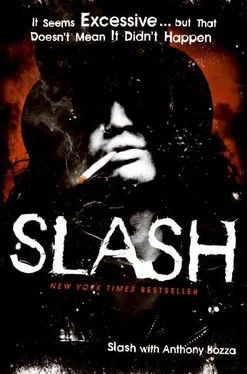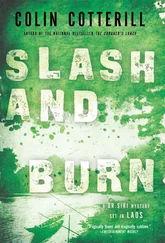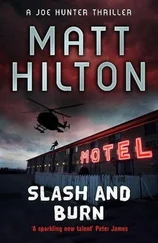I was housed in one of those big old-fashioned rooms with a few rows of cots, where I sweated it out, nauseous, sick, and exhausted. I’m not sure exactly how long I was there altogether; I suppose close to three days; then all of a sudden they let me out, again with no explanation, and I had to go through the whole fucking entrance process in reverse. Axl had put up the bail, and had Danny pick me up, but I didn’t know that as I made my way through the exit procedure in my little jumpsuit, waiting in long lines, sitting in a series of rooms, sweating and coughing and sniveling and fidgeting, smelling really bad and looking and feeling fucking miserable. When they handed me my clothes and belongings, I was finally informed why I was there: I’d been hauled in for a six-year-old jaywalking ticket. There had been a warrant out for me after I’d not shown up in court or paid the fine. Of all the things I’ve done, I got busted for jaywalking. Well, at least I did my time and paid my debt to society.
I walked around outside of county, bumming cigarettes for about an hour wondering who had bailed me out, until Danny suddenly showed up; we then drove straight down to Melrose and Western to cop. When I got back to the apartment, Axl was sleeping, so were Steven and Izzy, and Duff wasn’t around. I got high, took a shower, and when those guys woke up, I realized that they hadn’t even noticed that I’d been gone for a while. I wasn’t expecting much, but it would have been nice to get some degree of fanfare. When I found out later that Axl was the one who scraped together the bail money; I was touched. That was pretty cool of him.
DESPITE OUR LIFESTYLE AND ITS unconventional set of priorities, we did get a lot of things done in that apartment. We wrote an acoustic version of “You’re Crazy” that ended up as an electric version on Appetite and in its original form on Lies . We worked that one up at Dean Chamberlain’s, giving it that edge by speeding it up about twenty beats per minute from its original state. Axl, Izzy, and I had some really great creative times in that apartment. But regardless, our advance, both collectively and individually, had dwindled, so our quest for a manager was suddenly important: we had lost our lease and two of us had more or less devolved into everyday junkies that needed somewhere to live.
Tom Zutaut introduced us to Arnold Stiefel, a manager whose biggest clients at the time were Rod Stewart (whom I believe he still handles), and the actor Matthew Broderick, who was about to become a huge star off the back of Ferris Bueller’s Day Off . That didn’t impress us any. But after a few great meetings with Arnold and his partners, somehow we walked away with the most ideal situation imaginable: they hadn’t signed us outright, but they agreed to put us up in a house until we found a producer and made an album, at which point they’d decide if they wanted to sign on as our managers. I have no idea what kind of deal Tom made with them to make that happen, but this was the perfect short-term fix: they were willing to let us “evolve” on their tab.
I felt sorry for Tom by then. We were this self-destructive mutation of a band that he’d had the utmost confidence in and we were paying him back by showing no promise of ever getting it together. To us it seemed funny that none of the producers or managers seemed fit to do the job, but Tom was very aware that we were slowly but surely narrowing the “interest” gap between everyone in the industry and no one at all—I’m sure he was panicked: after two years he might lose his job if he didn’t make it work.
The only good thing that Tom, as an A&R man, got out of this was that when he picked us up and signed us, we had a couple of really good songs, but this period of time allowed us to write a bunch more really good songs. Maybe in the back of his mind, there was a method to Tom’s madness, maybe he knew that we needed this time and did everything he could to make it happen, because in the end he got the good stuff out of us. It was never stated as his intent, but I’m sure he looked at the bright side that way. This band took up so much of his time from the moment we were signed to the time we got our record done and got out on the road that it must have driven him insane. There was nothing that he could do to mold us or move the process along at all, because anything he tried failed. The band’s overall attitude and extracurricular activities opposed the right direction at every turn.
Out of desperation, Tom did manage to get us into the studio with Manny Charlton, the guitarist for Nazareth, at Sound City Studios on Whitsett and Moorpark out in the Valley. We worked on demos of “November Rain,” which was about eighteen minutes long in its original version, so needless to say we really needed to sit down and focus on arranging it. We also worked on “Don’t Cry,” and almost every other song that made it onto Appetite, except “Sweet Child o’ Mine,” because we hadn’t written that one yet. It was a great day in any case, hanging out in the studio recording everything live in this great big room. Unfortunately, Manny didn’t feel right. The demos sounded great, but they were just that: a bunch of great demo tapes. We knew enough about ourselves to know it wasn’t okay.
SHORTLY AFTERWARD WE MOVED INTO the Stiefel house, as we came to call it, a brand-new home in a gated community called Laughlin Park located way out in Griffith Park near the Observatory, the Greek Theater, and the L.A. Zoo. It was way out in East Hollywood, about a twenty-minute drive from where we used to live. That doesn’t seem like much, but since none of us had cars, this became the most unsocial period we ever knew.
We were stuck out there in a new house, in a new complex, in the woods. There were two bedrooms upstairs—one was Axl’s and one was Steven’s and Izzy and I shared a bedroom downstairs… due to our “shared interests.” We lived there for four or five months but had little furniture to speak of; we had beds, one table, and a couple of chairs in the entire house. Axl somehow managed to conjure up a proper bed, a lamp, and a dresser from somewhere: his room was a well-equipped oasis guarded by a padlock, but the rest of the place was basically empty. The lighting situation was equally meager: there was one lamp in Izzy’s and my room, an overhead light in the dining room, and no lights in the living room or above the stairs or in any of the hallways. The entire time we lived there, it looked as if someone was about to move in.
We did have a fireplace, and since we never bothered to buy lamps, once the sun went down, we lit fires and generally restricted ourselves to the living room or the kitchen, which also had an overhead light. We were so out of our element: for once we were living in a neighborhood where household items weren’t available for free on the street, in other people’s trash. The upside was that we were in such a far-off residential area that when we didn’t feel like playing acoustics, we could jam all night on our electric guitars. And if we’d owned practice amps we probably would have.
The drug lifestyle was a dominant reality in our lives, and it played a major role in everything we did at that point. Once it showed signs of wear, there was definitely light at the end of the tunnel… whether we liked it or not. It was obvious to us all that the free and easy overindulgent smack days we’d enjoyed in West Hollywood were done: we’d run out of money, most of the shit on the street had gone dry, and because of our new address, we were at the mercy of the only drug dealer willing to travel. It was not good at all: what had been very fun a short time ago was now a major pain in the ass. Unfortunately, we were in no shape to just up and quit and forget about it. We were forced to be conscientious and frugal as we strove to scale ourselves back.
Читать дальше
Конец ознакомительного отрывка
Купить книгу




![Сол Слэш Хадсон - Slash. Демоны рок-н-ролла в моей голове [litres]](/books/387912/sol-slesh-hadson-slash-demony-rok-n-thumb.webp)


